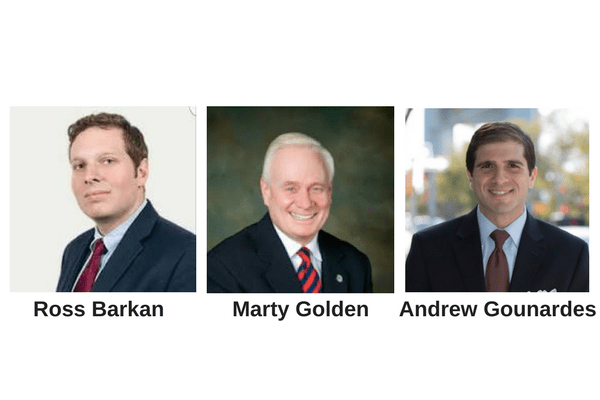State Senate Democratic candidate Andrew Gournardes released his economic platform Monday which aims to provide steps to improve the economy and allow equal chances at economic advancement for all New Yorkers.
The multi-pronged policy plan comes about five weeks before he meets fellow Democrat Ross Barkan in the Sept. 13 primary. The winner will take on State Sen. Marty Golden (R-Bay Ridge, Dyker Heights, Bensonhurst, Marine Park, Gerritsen Beach, Gravesend and parts of Sheepshead Bay, Borough Park and Midwood) in the November general election.

The plan named the “Economic Opportunity for All” program, contains 12 steps that are separated into sections titled “Fighting to Keep Housing Affordable for All,” “Supporting Small Businesses and Creating Good Paying Jobs,” and “Advancing New York City’s Technology to Improve the Economy.”
For housing, Gournardes plan includes tax relief for working-class families.
“I think it is a work in progress, but I am committed to solving that problem,” he said.
Gounardes said he plans on speaking with groups to come up with a comprehensive plan to reduce property taxes. He pointed to heavy tax breaks for luxury condos in Manhattan as a source of the uneven distribution of property taxes in Brooklyn.
“When you have people paying four or five figures in property taxes in neighborhoods like Bay Ridge and Dyker Heights, and a lot less in Park Slope, something is wrong,” he said.
Another area of housing improvements Gounardes is supportive of is using state-owned land to build additional housing in areas with rapidly increasing populations, such as the land the MTA-owned and state-controlled railyards in his district.
“I’m fully supportive of using open land we have to build affordable housing, not luxury, but housing the working person can afford,” Gounardes said.
Other parts of his affordable housing plan include drafting legislation to legalize basement apartments and improve existing conditions, enacting a first time home buyer assistance program and repealing the Urstadt law, which gives power to state politicians to have control over rent laws in the city. Instead, Gounardes would like to see the power shift back to the city.
“Too many New Yorkers are just one or two paychecks away from losing the roof over their heads,” said Gounardes. “They are feeling the crush of rising property taxes which makes it harder and harder each year for them to stay in their homes. The Republican State Senate has neglected to take the necessary steps to improve the situation. This is unacceptable.”
For the business side of his plan, Gounardes would like to shift attention to small businesses, which he wants to achieve through creating a local regional business council in South Brooklyn.
“I think when people think about economic development they think about big projects,” he said.
The council would focus on small business projects that could otherwise be overlooked in the big picture of economic development.
“Small businesses are the lifeblood of our economy, comprising ninety-eight percent of New York State businesses and employing more than half of New York’s private sector workforce,” said Gounardes. “Our government can and should do more to support entrepreneurs, help businesses grow, and create good paying jobs.”
The other sections of the business plan include supporting a living wage, closing the wage gap, creating a local regional business council and encouraging new startups and freelancers.
The final section of Gounardes plan is speeding the progress of technological improvements in New York City.
His plan includes supporting state legislation that ensures net neutrality, providing students with high speed and high-quality in-school internet and facilitating New York City’s transition into a “smart city.”
Gournardes idea of a “smart city” includes adding electrical charging stations for vehicles through the boroughs, and increasing the use of electrical sensors to technology to improve the quality of life for New Yorkers.
“Technology opens up new ways to improve medicine, transportation, and quality of life,” said Gounardes. “At the forefront of many of these changes is the internet. An open and free internet is essential to a large majority of our daily functions. It’s how our children research and learn about the world, it’s how we communicate with family and friends, and it’s how many of us get our jobs done. These functions, along with the general advancement of technology in New York City, can’t be stifled by partisan special interests.”










